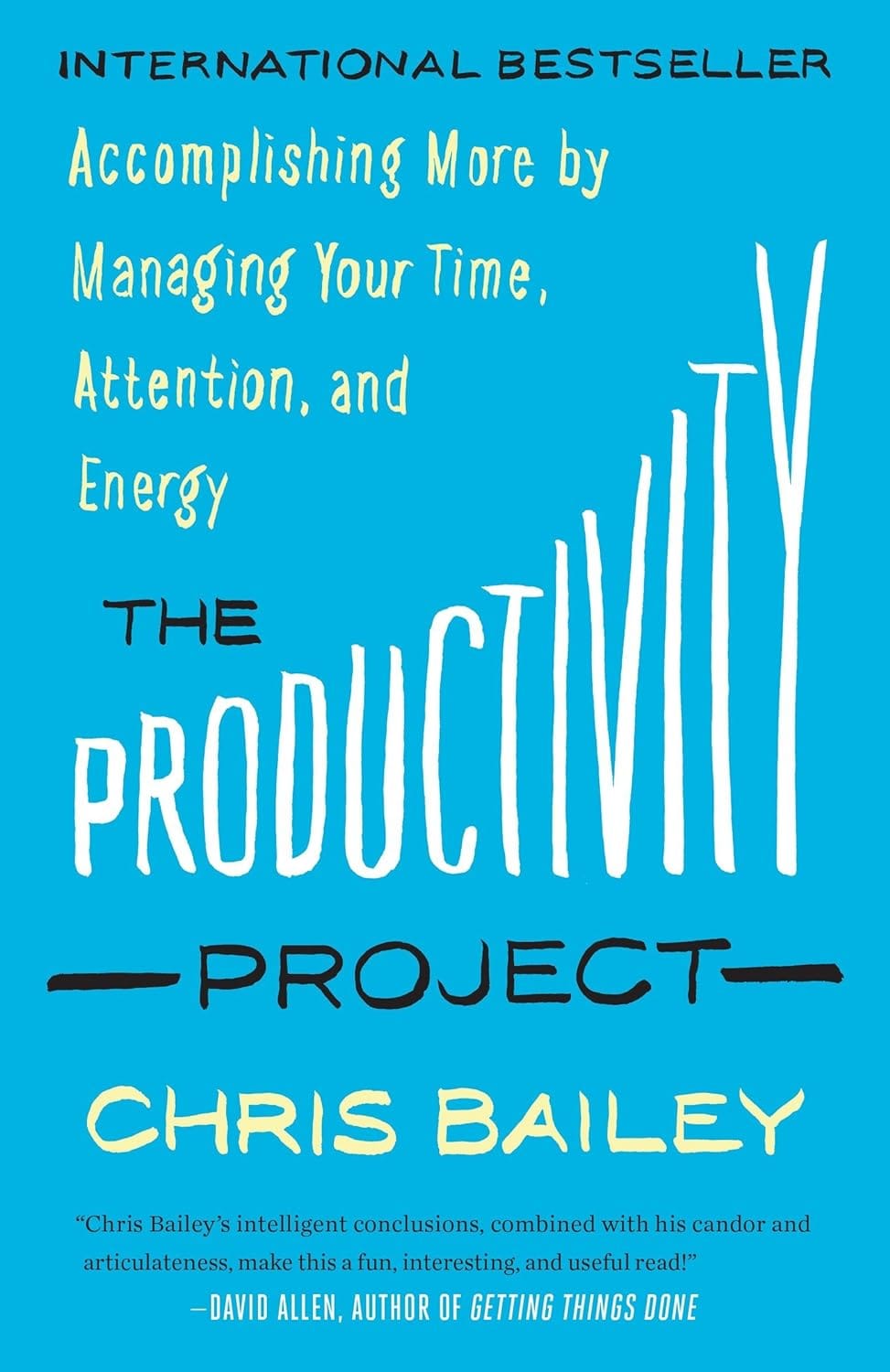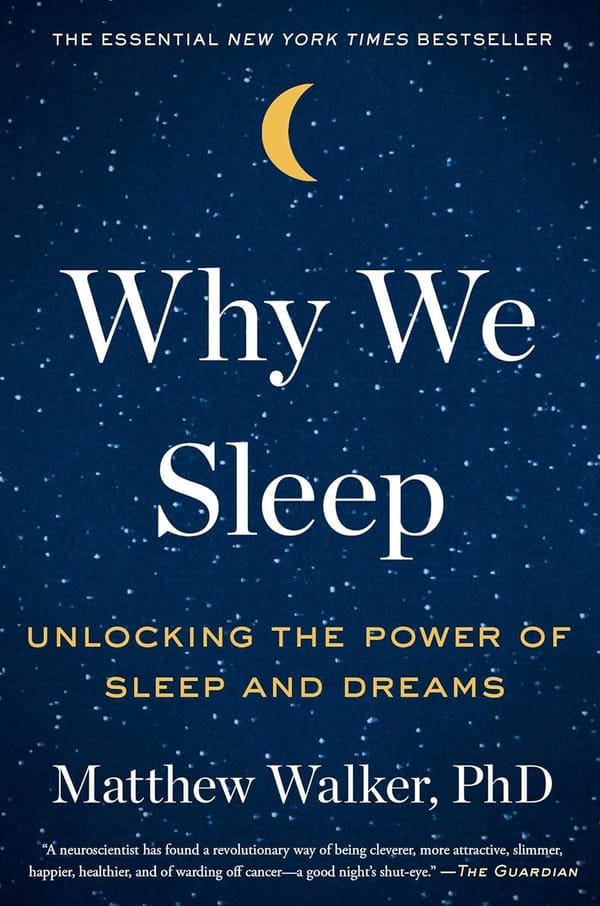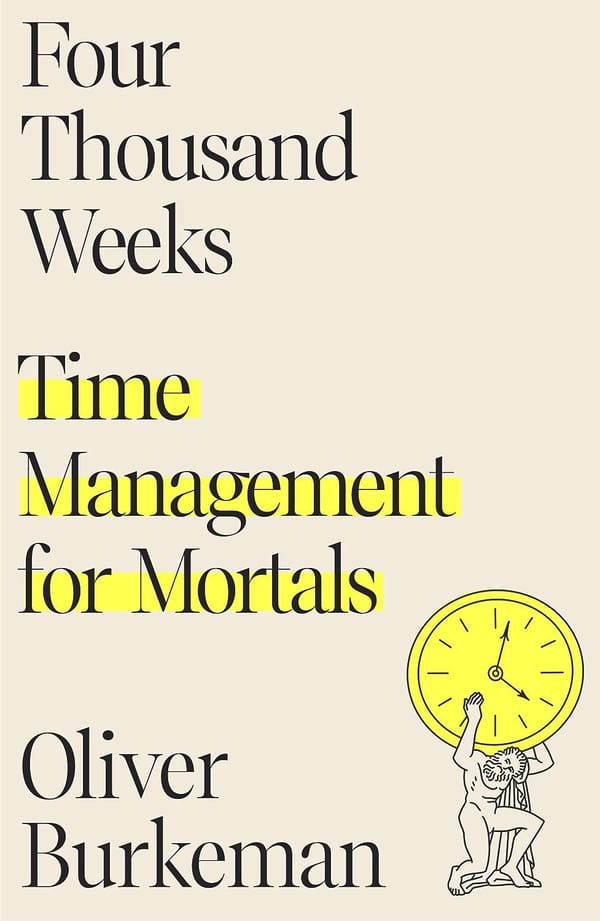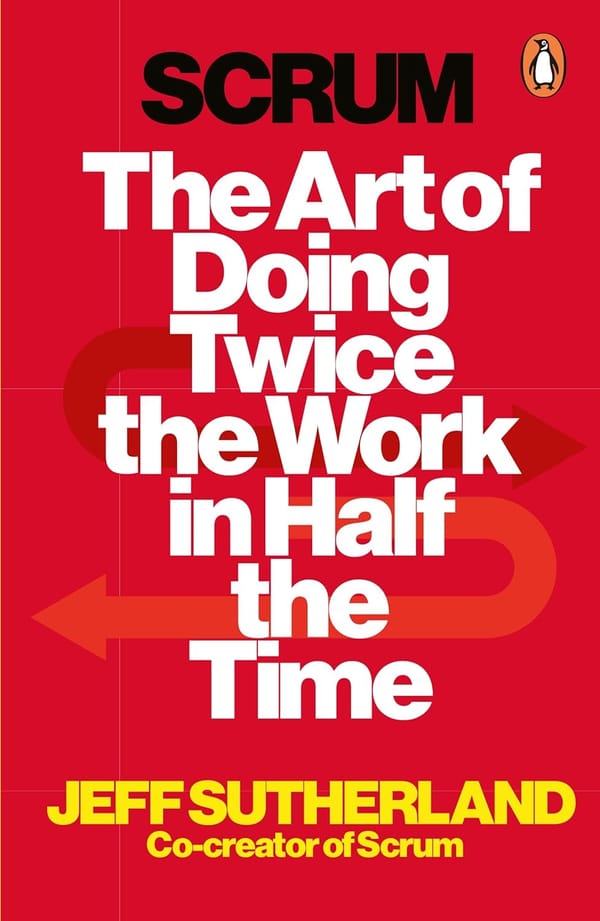The Productivity Project - Book Notes
Unlock Your Productivity Potential: Transform Your Life with Purposeful Action
Are you tired of feeling overwhelmed by endless to-do lists and distractions? Do you crave a more purposeful and fulfilling approach to productivity? Dive into my review of "The Productivity Project" by Chris Bailey, where you'll discover practical strategies to reclaim your time, energy, and focus.
In a world filled with constant demands and distractions, Bailey's holistic approach to productivity offers a refreshing perspective. By understanding the importance of aligning tasks with your values and goals, you can unlock your true potential and accomplish what truly matters.
Join me as we explore the transformative power of prioritization, self-care, and meaningful relationships. Let's embark on a journey towards a more balanced and fulfilling life—one productive step at a time.
If you enjoyed my review, consider supporting me by using the affiliate links below to purchase the book. Your kindness fuels my passion for sharing captivating reads with you!
🚀 The Book in 3 Sentences
- "The Productivity Project" by Chris Bailey offers a holistic approach to productivity, emphasizing the importance of understanding one's motivations and priorities.
- Through managing time, energy, and attention effectively, individuals can focus on meaningful tasks that align with their goals and values.
- By prioritizing self-care, minimizing distractions, and fostering meaningful relationships, readers can cultivate a balanced and fulfilling life while maximizing their productivity and success.
👱 Who Should Read it?
I think it's a good read for people working in a knowledge job, which are struggling with handling all their tasks, feel overwhelmed and lack energy/focus to complete their tasks. It's also helpful for people in non-knowledge jobs, as it has some good advice on how to boost your energy levels.
🍀 How the Book Changed Me
The Rule of 3 had a profound impact on me. Starting each day by identifying my three most important tasks helped me focus my efforts and prioritize effectively. Additionally, implementing a digital detox after 8 PM not only reduced my stress levels but also deepened my connections with loved ones.
✍️ Top 3 Quotes
- "Productivity is not about how efficiently you work. Productivity is about how much you accomplish."
- "...deeply care about your productivity goals, about why you want to become more productive."
- "When someone says they “don’t have time” for something, what they’re really saying is that a task isn’t as important or attractive as whatever else they have on their plate."
🔨 3 Action Points
- Identify Your Priorities:
Take time to reflect on your goals and values to determine your true priorities. Use the Rule of 3 to identify the three most important tasks for each day or week, ensuring that your efforts are focused on activities that align with your overarching objectives. - Manage Distractions:
Implement strategies to minimize distractions and maintain focus during work periods. This could involve scheduling specific times for checking emails and social media, turning off notifications on electronic devices, or creating a designated workspace conducive to concentration. - Prioritize Self-Care:
Make self-care a priority by incorporating practices such as meditation, exercise, adequate sleep, and healthy eating habits into your daily routine. Prioritizing your physical and mental well-being will replenish your energy reserves, reduce stress, and enhance your overall productivity and satisfaction.
📗 Summary & Notes
Understanding Productivity Beyond Efficiency
In "The Productivity Project," Chris Bailey challenges the conventional notion that productivity is solely about working efficiently. Instead, he advocates for a more nuanced understanding, emphasizing that true productivity is about accomplishing meaningful tasks rather than simply being busy. Bailey argues that while efficiency is important, it's ultimately the impact and value of one's actions that define productivity. This shift in perspective encourages individuals to focus on tasks that align with their goals and values, leading to a more fulfilling and purpose-driven approach to productivity.
The Three Pillars of Productivity: Time, Energy, and Attention
Bailey identifies three interconnected elements essential for productivity: time, energy, and attention. Managing these components effectively is crucial for achieving desired outcomes. Time management involves allocating resources efficiently and prioritizing tasks based on their importance and urgency. Energy management focuses on maintaining optimal levels of physical and mental energy throughout the day, recognizing the impact of factors such as sleep, nutrition, and exercise. Attention management involves cultivating the ability to focus deeply on tasks without succumbing to distractions, thereby maximizing productivity and minimizing wasted effort.
Finding Your Why: The Importance of Purpose
Central to Bailey's approach is the concept of understanding one's motivations for becoming more productive. Before implementing any changes, it's essential to introspect and identify the underlying reasons driving the desire for increased productivity. Whether it's to pursue personal goals, advance in a career, or simply lead a more fulfilling life, having a clear sense of purpose serves as a powerful motivator and guide. By aligning productivity efforts with personal values and aspirations, individuals can cultivate a sense of meaning and direction in their endeavors.
Prioritization and Focus: Doing the Right Things
Productivity isn't about doing more tasks; it's about doing the right tasks. Bailey introduces the Rule of 3, a simple yet powerful strategy for prioritizing objectives. By identifying the three most important tasks for the day or week, individuals can focus their efforts on activities that yield the greatest impact. This approach encourages deliberate decision-making and helps prevent the tendency to become overwhelmed by an endless list of tasks. By focusing on quality over quantity, individuals can channel their energy and attention towards activities that align with their goals and values, ultimately leading to greater fulfillment and success.
Overcoming Procrastination: Understanding the Psychology
Procrastination is a common barrier to productivity, often driven by the conflict between the limbic system (emotional brain) and the prefrontal cortex (logical brain). Bailey offers practical strategies for overcoming procrastination, such as creating procrastination lists and understanding the triggers behind delaying tasks. By addressing underlying psychological factors and implementing targeted interventions, individuals can develop healthier habits and overcome the tendency to procrastinate. Additionally, cultivating a growth mindset and practicing self-compassion can help individuals navigate setbacks and maintain momentum in their productivity journey.
Managing Distractions: Maintaining Focus in a Digital Age
In today's hyperconnected world, distractions abound, particularly with the pervasive influence of the internet. Bailey provides insights into managing distractions effectively, including techniques like time tracking and implementing the Parkinson's Law to set artificial deadlines. By creating structured environments and establishing boundaries around technology use, individuals can minimize distractions and optimize their focus. Additionally, practicing mindfulness and adopting strategies for attention management can help individuals cultivate a deeper sense of presence and engagement in their daily activities, leading to heightened productivity and satisfaction.
Tactics to avoid distractions:
- Notifications: Turn off all notifications from your devices and instead check them on a schedule. Your Limbic system will make you feel like you are less productive as it is not as stimulating, but you'll get more things done like this.
- 20 Second Rule: 20 seconds is enough to keep distractions at bay. E.g. put your phone in another room, so that it takes more than 20 seconds to reach it. Or keep your filing cabinet right next to your desk to file things away in less than 20 seconds.
Self-Care for Productivity: The Importance of Well-Being
Bailey emphasizes the integral role of self-care in enhancing productivity. Strategies such as meditation, exercise, adequate sleep, and healthy eating habits contribute to optimal mental and physical well-being, ultimately boosting productivity. By prioritizing self-care practices, individuals can replenish their energy reserves, reduce stress, and enhance their ability to perform at their best. Additionally, fostering a supportive work-life balance and engaging in activities that bring joy and fulfillment can contribute to overall happiness and productivity.
Eating for Productivity
Your brain makes up 2-3% of your body, but uses 20% of the calories you consume. You need energy to be productive.
- Prioritize nutrient-dense foods such as fruits, vegetables, whole grains, and lean proteins to provide sustained energy throughout the day.
- Incorporate healthy fats like avocado, nuts, and seeds to support brain function and focus.
- Minimize consumption of sugary snacks and processed foods to avoid energy crashes and fluctuations.
- Consider meal prepping and planning to ensure access to nutritious meals and snacks during busy days.
Drinking for Productivity
Sugary drinks are bad for your productivity, because they lead to a high level of glucose immediately and a crash afterwards.
Drinking water fires up your metabolism in the morning. Drinking water before eating helps losing weight as it fills your stomach. It helps you think more clearly and it reduces the risk of many diseases.
- Consume caffeine in moderation to enhance alertness and focus, but avoid excessive intake, which can lead to jitters and disrupted sleep.
- Opt for hydrating beverages such as water, herbal teas, and infused water to maintain optimal hydration levels.
- Limit alcohol consumption, especially before bedtime, as it can disrupt sleep patterns and impair cognitive function.
Exercising for Productivity
One of the main problems people face is the time needed to exercise, as they feel like they have more important commitments or are more productive when they work 30 minutes longer than exercising for 30 minutes, but exercising more will actually save you time as you will have more energy and focus and accomplish the same amount of work in less time.
- Incorporate regular physical activity into your routine to boost energy levels, improve mood, and enhance cognitive function.
- Choose activities that you enjoy and can easily fit into your schedule, such as walking, jogging, cycling, or yoga.
- Take short active breaks throughout the day to stretch, move, and recharge your body and mind.
- Prioritize consistency over intensity, aiming for daily movement rather than sporadic intense workouts.
Sleeping for Productivity
Your body requires 7-9 hours of sleep. Sleeping is exchanging time for energy.
The key for getting enough sleep is not when you wake up, but when you go to bed, as most people don't have the freedom to choose when they start to work in the morning, but have control over when they go to bed in the evening.
Waking up early doesn't increase your productivity, having enough and good sleep does.
- Establish a consistent sleep schedule by going to bed and waking up at the same time each day, even on weekends.
- Create a relaxing bedtime routine to signal to your body that it's time to wind down, such as reading, taking a warm bath, or practicing relaxation techniques.
- Designate your bedroom as a sleep-friendly environment by keeping it cool, dark, and quiet.
- Limit screen time and exposure to electronic devices before bedtime to minimize disruptions to sleep quality.
- Prioritize sleep as a non-negotiable part of your routine, recognizing its critical role in supporting cognitive function, mood regulation, and overall productivity.
Building Meaningful Relationships: The Human Element of Productivity
Beyond individual achievements, Bailey underscores the significance of human connection in the productivity journey. Cultivating and nurturing relationships not only provide a sense of purpose but also contribute to overall well-being, thereby elevating productivity. By investing time and effort in building meaningful connections with others, individuals can foster collaboration, support, and mutual growth. Whether through networking, mentorship, or simply spending quality time with loved ones, cultivating strong relationships can enrich both professional and personal endeavors, enhancing productivity and fulfillment.
Conclusion: A Holistic Approach to Productivity
In "The Productivity Project," Chris Bailey offers a holistic framework for enhancing productivity by understanding the interconnected elements of time, energy, attention, and personal motivations. By fostering well-being, prioritizing meaningful tasks, and cultivating supportive relationships, individuals can cultivate a more fulfilling and productive life. Through intentional effort and continuous self-reflection, individuals can unlock their full potential and achieve greater success and satisfaction in all areas of their lives.
I'd love to hear about your experiences with productivity and any insights you've gained from Bailey's book. Share your thoughts in the comments below and let's continue the conversation!



